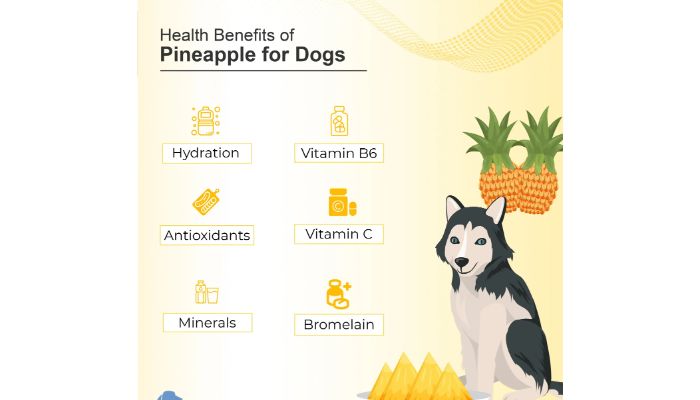You’ve seen your dog eye that juicy pineapple on the counter, but is it safe to share? While pineapple’s sweetness tempts, it’s crucial to consider your furry friend’s health first.
Packed with vitamins, it seems like a healthy treat, but there are risks you can’t ignore. We’ll dive into the nutritional benefits, potential hazards, and how to safely indulge your pup’s tropical cravings.
Keep your dog’s tail wagging with the right knowledge of pineapple snacks.
Nutritional Benefits of Pineapple:

While you may often worry about what’s safe for your furry friend to eat, pineapple can actually offer them various nutritional benefits when fed in moderation. This tropical treat is loaded with vitamins, minerals, and fiber, which are essential for a balanced canine diet. Notably, pineapple enzymes, particularly bromelain, aid in protein digestion and can help with your dog’s absorption of nutrients. Bromelain also boasts anti-inflammatory properties, which might support joint health and reduce inflammation.
Moreover, pineapple provides a good dose of vitamin C, an antioxidant that supports the immune system. However, it’s crucial to serve pineapple in small amounts due to its high sugar content. Always remove the tough core and spiky skin to prevent any choking hazards or digestive issues.
Potential Risks and Concerns:
Despite its nutritional benefits, you should be aware that pineapple poses certain risks to your dog if not prepared and served properly.
Pineapple allergies, though uncommon, can occur in dogs. If you notice symptoms like itching, swelling, or gastrointestinal upset after your dog consumes pineapple, it’s important to consult your vet.
Moreover, the high fiber content could lead to digestive issues such as diarrhea or constipation if your pet eats too much.
Always remove the tough, spiky skin and hard core because they aren’t only difficult to digest but could also cause choking or intestinal blockage.
Ensure that pineapple is offered in small, manageable chunks and only as an occasional treat to minimize these risks.
Safe Serving Suggestions:

To safely incorporate pineapple into your dog’s diet, offer it in small, bite-sized pieces as an occasional treat. It’s crucial to adjust pineapple portions to the size of your dog; a large dog can handle slightly larger pieces than a small dog. The high fiber content of pineapple can be beneficial in moderation but can cause digestive issues if overfed.
Serving frequency should also be considered—pineapple shouldn’t be a daily addition to your dog’s diet. Instead, offer it once or twice a week as a special reward. Always remove the tough, spiky skin and the hard central core before serving to prevent choking hazards.
Watch for any signs of adverse reactions, and consult your veterinarian with any concerns regarding dietary changes.
Signs of Pineapple Intolerance:
If your dog’s digestive system reacts poorly to its pineapple treats, it may display signs of intolerance that you’ll need to recognize. Pineapple reactions can range from mild discomfort to more severe symptoms that could require a vet’s attention. Be vigilant and look out for the following intolerance symptoms:
- Vomiting or regurgitation: This could be a sign that your dog’s stomach is rejecting the pineapple.
- Diarrhea: Frequent, loose stools may indicate a digestive upset.
- Abdominal pain: If your dog appears uncomfortable, whines, or has a tender belly, this could be a sign of gastrointestinal distress.
- Lethargy: An unusual lack of energy may accompany other intolerance symptoms, suggesting that the pineapple isn’t agreeing with your pet.
It’s important to monitor your dog closely and consult your vet if any of these symptoms persist.
Alternatives to Pineapple Treats:
Should your dog show any of these intolerance signs, there are several other treats you can offer instead of pineapple. Pumpkin bites, for instance, are a fantastic alternative. They’re not only delicious for most dogs but also provide a good source of fiber, which can help with digestion. Apple slices are another healthy option, offering vitamins and fiber, but remember to remove the seeds and core first, as they can be harmful to dogs.
| Treat Type | Benefits |
|---|---|
| Pumpkin Bites | High in fiber |
| Apple Slices | Vitamins & fiber |
Choosing these alternatives ensures your furry friend isn’t missing out on treat time while maintaining their health and happiness.
Frequently Asked Questions:
Pineapple treats can be acidic, but a dog’s enamel resilience is generally strong. Moderation is key to prevent dental issues, ensuring you’re not compromising your pet’s oral health with frequent acidic snacks.
You’ve noticed your dog’s energy spikes after munching on pineapple treats. While it’s not typical behavior, the natural sugars can cause short-term hyperactivity, so moderation is key to avoiding these unintended bursts of energy.
You won’t find breeds with genetic sensitivities specifically to pineapple, but you should consider individual breed diets and consult your vet, as some dogs may have conditions that make pineapple an unsuitable treat.
Yes, dogs can have enzyme allergies, including sensitivity to bromelain found in pineapples. It’s a rare reaction, but it’s crucial to monitor for any signs of discomfort or allergic response.
You should know that aside from sugar content, pineapple fiber affects your dog’s digestion variably. Canned varieties pose a preservative risk, while fresh or frozen pineapple is generally safer for your pet’s health.
Conclusion:
In conclusion, while pineapple packs a nutrient-rich punch for you, it’s a treat to give your dog in moderation. Remember, although a mere 20% of dogs show fruit preferences, pineapple can be a tasty and beneficial snack.
Always serve it in small, well-prepared portions to avoid any risks. If your furry friend doesn’t take well to pineapple, plenty of other healthy alternatives are available.
Stay informed, and keep your pup’s tail wagging with safe, delicious treats.

Hey there, I’m Janet Brooks, a dog-loving student from California. I’m all about helping pups in need, especially those without homes. Me and my awesome friends work together to give shelter and love to stray dogs. Oh, and I also write blogs about dogs to share helpful info.